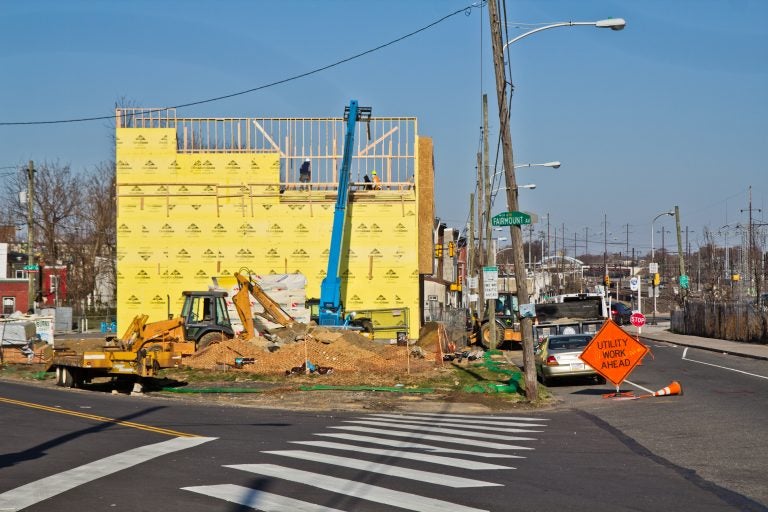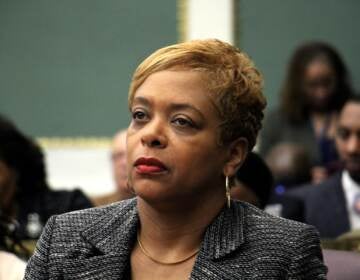Why Philadelphia’s councilmanic prerogative isn’t going away
No matter who wins on Election Day, councilmanic prerogative is likely not going away. Here’s why.

Market-rate town homes are under construction at 3300 Mantua Avenue. Councilwoman Jannie Blackwell steered the lot to the project's developer. (Kimberly Paynter/WHYY)
This article originally appeared on PlanPhilly.
—
Philadelphia’s 2019 municipal primary will be remembered for the sheer number of candidates running for spots on City Council. But it is also a political cycle in which broad themes like crime and education took a backseat to housing and land use issues for a number of a campaigns.
For one, councilmanic prerogative –– a tradition in which broad deference over land use is given to district council members –– went from mere City Hall jargon to the forefront of two hotly contested district races.
This political debate has renewed questions about the nature of prerogative and whether the practice could or should be abolished. And, while land use experts agree Philly is an outlier in terms of the role council members play in the development process, some say electoral politics may not offer many easy fixes.
To date, this debate has gotten most heated in two competitive district races: the race between incumbent Second District Councilman Kenyatta Johnson and newcomer Laura Vidas and the Third District race between incumbent Councilwoman Jannie Blackwell and challenger Jamie Gauthier. Both Johnson and Blackwell have defended their involvement in development as a way to provide more community input in the development process.
“Councilmanic prerogative is a tool we can use to protect neighborhoods from gentrification and from out-of-town developers who don’t know anything about the neighborhood,” said Mark Nevins, a campaign spokesperson for Johnson. “Removing council members from the conversation about how city-owned property is sold and developed would basically prevent local residents from having a say in the future of their neighborhoods.”
Their respective challengers have both campaigned against councilmanic prerogative, asserting that it engenders a pay-to-play culture between elected officials and developers.
“It’s a problem from day one. When people go to get a piece of land from the city, the first question they’re asked is ‘Do you have a letter from your councilmember,’” Vidas said. “It creates a perception that unless you donate to that council person you can’t get anything done.”
Prerogative has a long history in Philadelphia. Akira Rodriguez, a city planning fellow at the University of Pennsylvania studies the impact of government policy on marginalized communities. She traces the history of councilmanic prerogative to the city’s 1951 charter and a well-intentioned revolt against heavy-handed urban renewal efforts in the mid-20th century that erased entire neighborhoods for highways, campus expansion and other projects.
But Rodriguez said that as city land values rebounded in the 21st century, this power began to change. As the gatekeeper for land use, council became an increasing target for real estate interests eager to influence development and or snap up vacant city-owned lots.
“It’s easy for developers to bribe one councilman. It’s much harder to bribe the redevelopment authority, the planning commission, all the registered neighborhood organizations and neighborhood groups,” she said.
Rodriguez said strengthening those neighborhood groups as a direct conduit for neighborhood input and strengthening the role of city planners could diffuse that power. But she acknowledged that these steps would mean asking City Council to give up part of its greatest source of power — a long shot in a body with 10 members who preside over land use issues in geographically defined districts.
“It’s about breaking up the influence. But I can’t even think of a city council that’s reformed itself in the past 30 or 40 years,” she said. “I think if you get that right mix of young, progressive people, it could happen. But that is like a 20-year process. It’s hard.”
Winnie Branton, an attorney who has consulted on government land use issues across Pennsylvania, said removing council influence in land sales would be even more difficult. Philadelphia’s city charter contains a clause requiring council approval for public land sales, a requirement that can only be changed through an unlikely supermajority vote by council and a public referendum.
“I don’t see any chance that they would all agree to do that,” she said.
Branton said the city’s Land Bank was meant to serve as a workaround, placing public land under the ownership of the quasi-governmental entity, with council approval. The organization would steer land toward equitable uses and Council would still have a voice by appointing members to its board.
The problem: Council failed to move thousands of city lots to the Land Bank and wrote itself into the new sale process, a level of political involvement unseen in dozens of similar authorities across the Keystone State.
“Only the Pittsburgh and Philadelphia land banks have provisions in there that require council approval, and Pittsburgh’s has a sunset provision,” she said.
Branton said an easier lift than attempting to abolish prerogative altogether might be pushing to fix Philadelphia’s land bank. She said the ultimate goal should be to both simplify the sales process and increase transparency –– something that was difficult to accomplish under a system where the process differs from council district to council district.
“I love the fact that there’s representative government and when council is trying to protect and serve their district. But there has to be more transparency to these transactions,” she said. “If, say, you’re going to have a policy to get land to minority developers, it should be advertised to all minority developers, not just people who are close to the councilmember.”
Rodriguez also argued for more equity in development as the city grappled with increasing property values and gentrification. But she said that, from a national perspective, Philadelphia had little to show for council members’ unusually direct involvement in land use decisions.
She noted that, under the current system, there was little to stop individual council members from blocking affordable housing or selling off lots to unscrupulous developers.
“Philly is increasingly trying to position itself as this progressive city but it doesn’t have any progressive policies or behavioral norms when it comes to development,” she said. “Philly has all the tools it needs to do development in an equitable manner. But you can’t have a transparent and equitable planning process that can get totally scuttled by one council person’s opinion.”
Correction: A previous version of this article imprecisely identified the organizational structure of the Philadelphia Land Bank. That has been updated.
WHYY is your source for fact-based, in-depth journalism and information. As a nonprofit organization, we rely on financial support from readers like you. Please give today.







